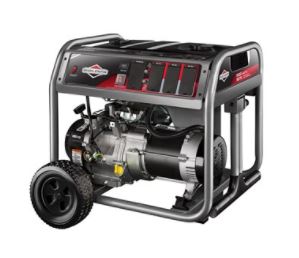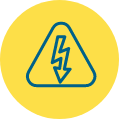Nobody likes being left in the dark. Using the right backup power can help make your home more comfortable and safer during a power outage.
Having staples, like extra food and water, can be helpful in an emergency. But what about power? A small source of backup power can save a freezer full of food, keep lights on and charge phones until the power comes back on.
 Portable generators come in a variety of sizes, but one of the easiest to manage is in the 3,500 to 5,000 watt range. They’re simple to operate, but you want to pay close attention to a few things:
Portable generators come in a variety of sizes, but one of the easiest to manage is in the 3,500 to 5,000 watt range. They’re simple to operate, but you want to pay close attention to a few things:
* Always operate a gas generator outdoors, instead of indoors or in your garage, because of deadly carbon monoxide build up.
* Never operate a generator in standing water to avoid electric shock.
* Remember that parts of the generator get very hot during operation.
Proper maintenance is important. Have your generator serviced annually and keep plenty of fuel and oil on hand to be sure it’s ready when you need it. While it’s best to store a generator empty, you can use a fuel stabilizer to leave fuel in it for up to 12 months. Run your generator once a month to keep it good condition, and change the filter once a year.
For convenience, it’s possible to have your generator wired directly into your electrical panel. This should only be done by a licensed electrician, and it requires a special disconnect switch. Without the switch, the generator can feed back onto the grid, harming utility workers who are trying to restore power. The safest way to use a portable generator is to plug directly into the unit.
When the time comes, move the generator to a dry, level outdoor space to start it. Plug loads directly into the generator using short, heavy-duty extension cords to minimize the chance of the cords overheating. Always let the generator cool before refueling.
Using a generator safely can keep food from spoiling, the lights on and phones working, helping to make your home more comfortable and safer during an outage.
If you are not interested in doing the setup, operation and regular maintenance of a portable generator yourself, there is always the automatic generator option. Once an automatic standby generator is installed and wired into your electric service by a licensed electrician, you no longer have to worry about power outages. An automatic generator will start when the power goes out, even if you are not home. It will provide electricity to most of your home’s appliances and it will automatically turn off after the Co-op power is restored.
McLeod Co-op Power sells both automatic Briggs & Stratton generators 12 kW to 20 kW and smaller portable generators and inverters. The Co-op can assist members in determining what system would be best to meet their personal needs. Automatic generators are installed by the Co-op and regular maintenance/service is available through the Co-op also.
